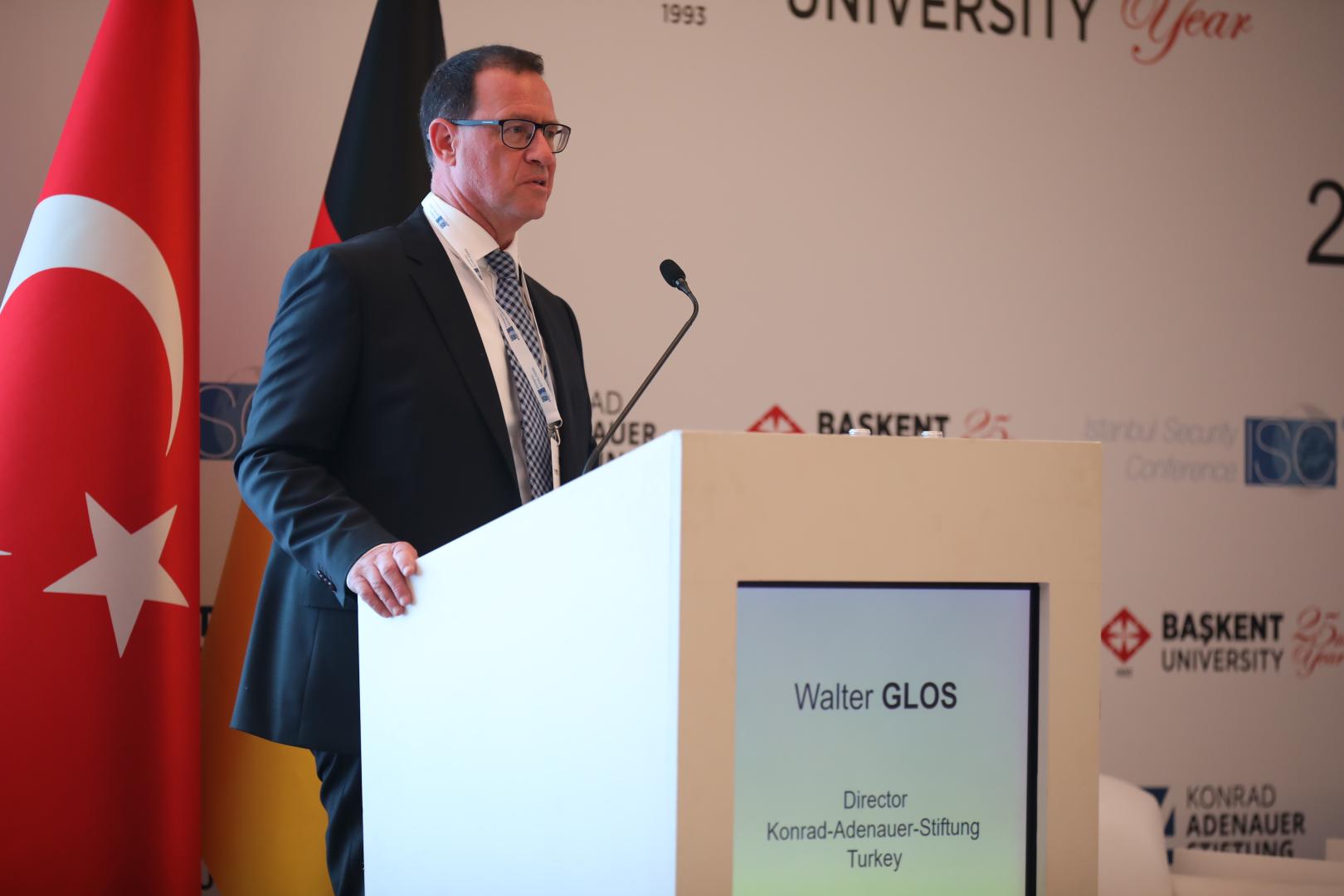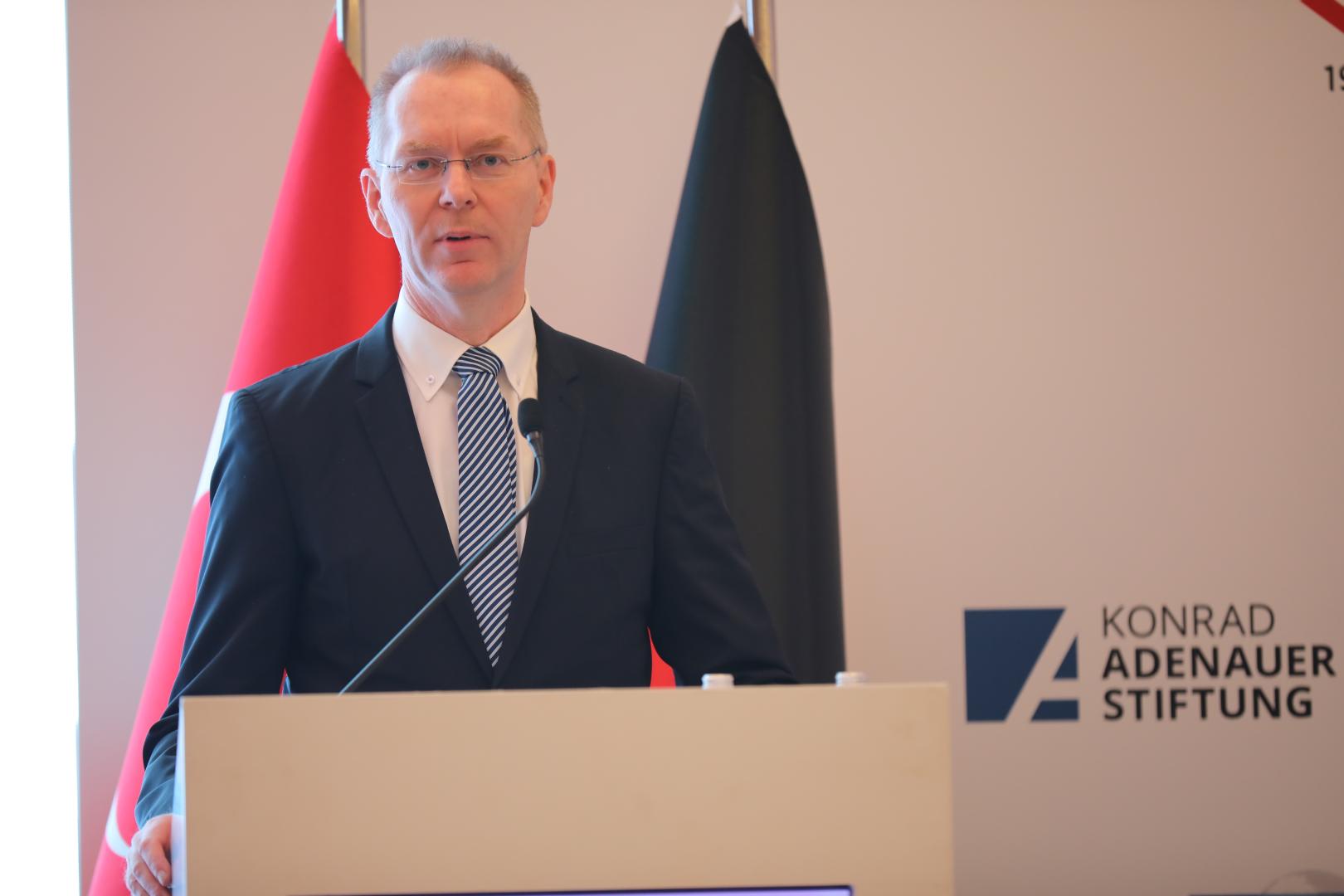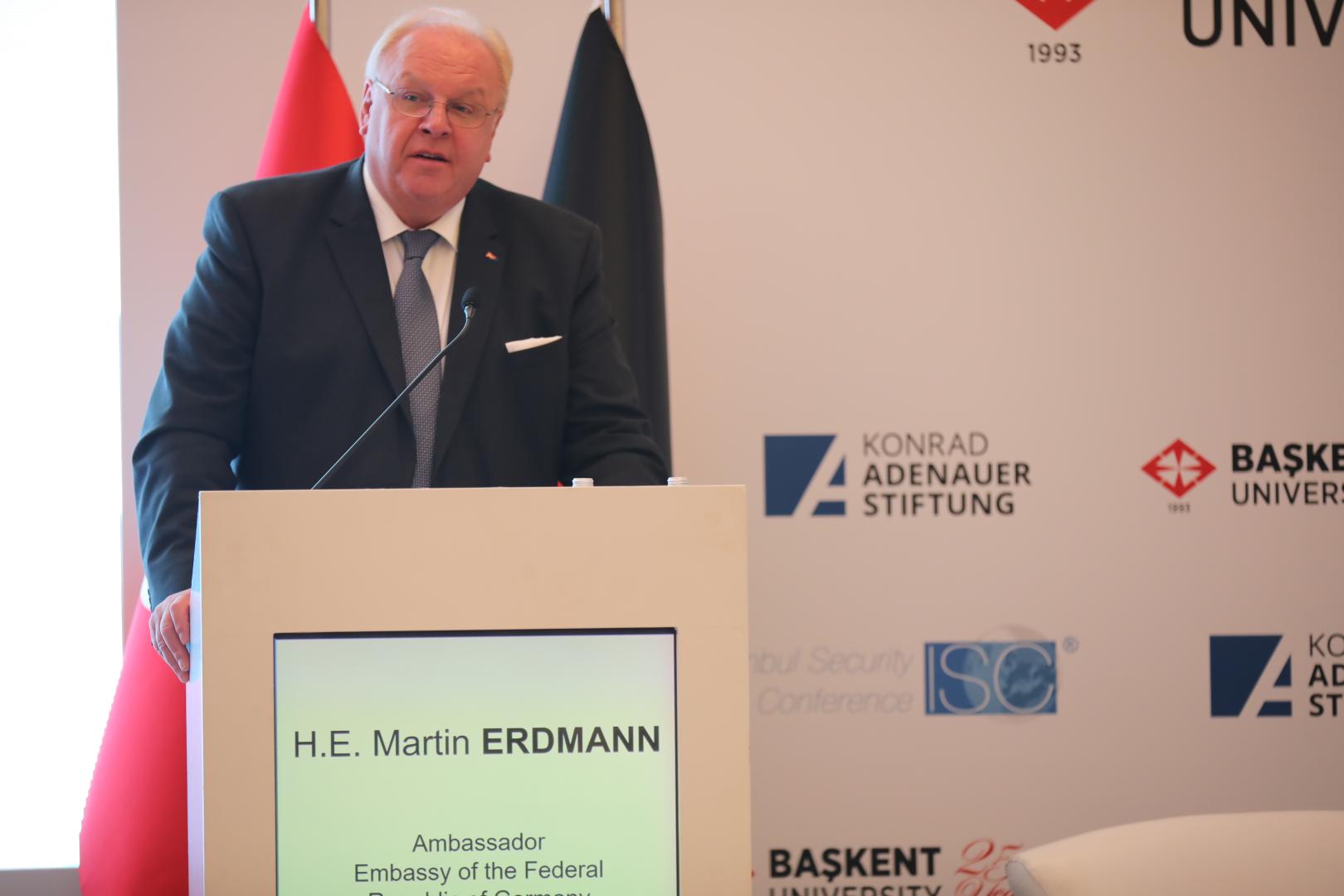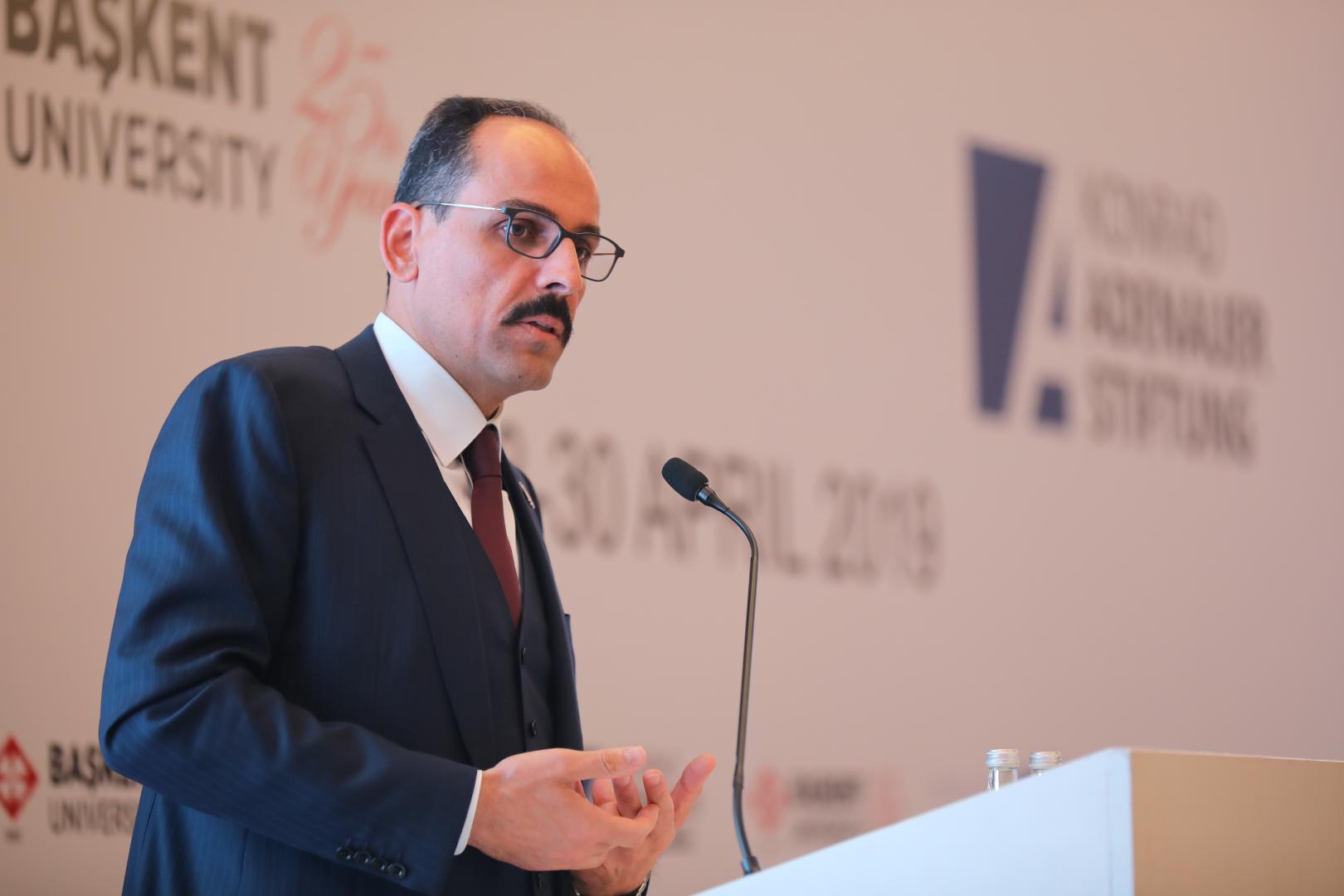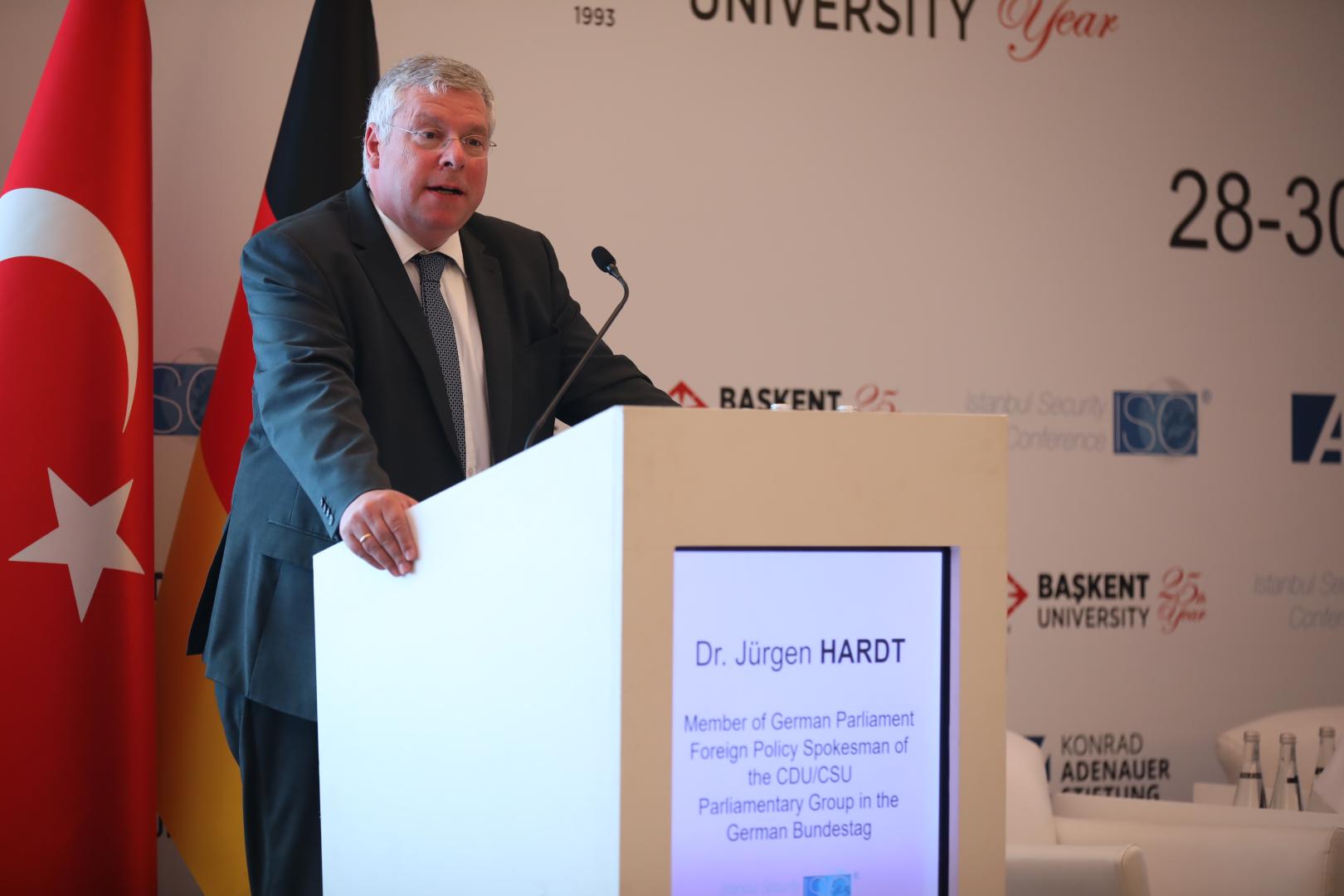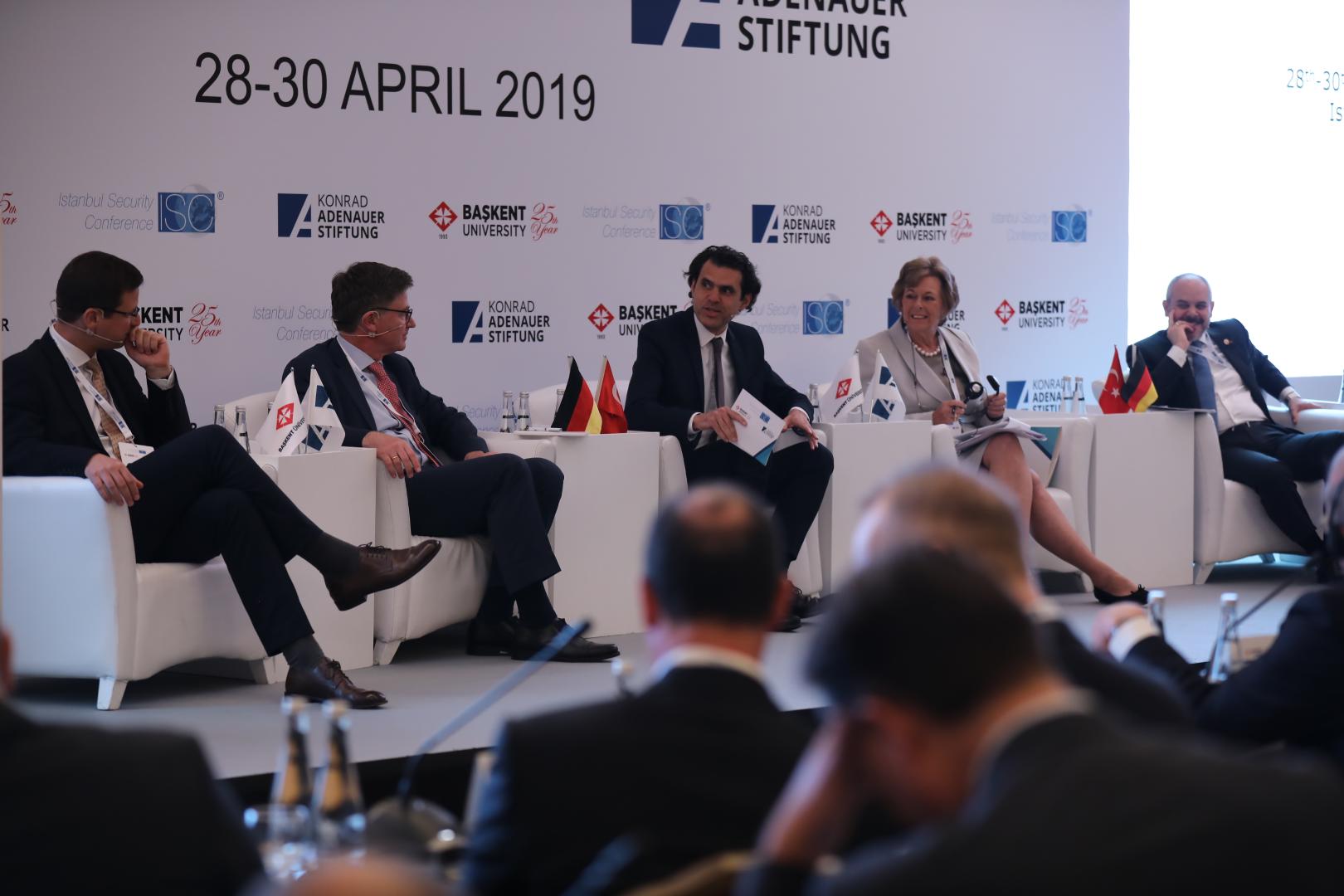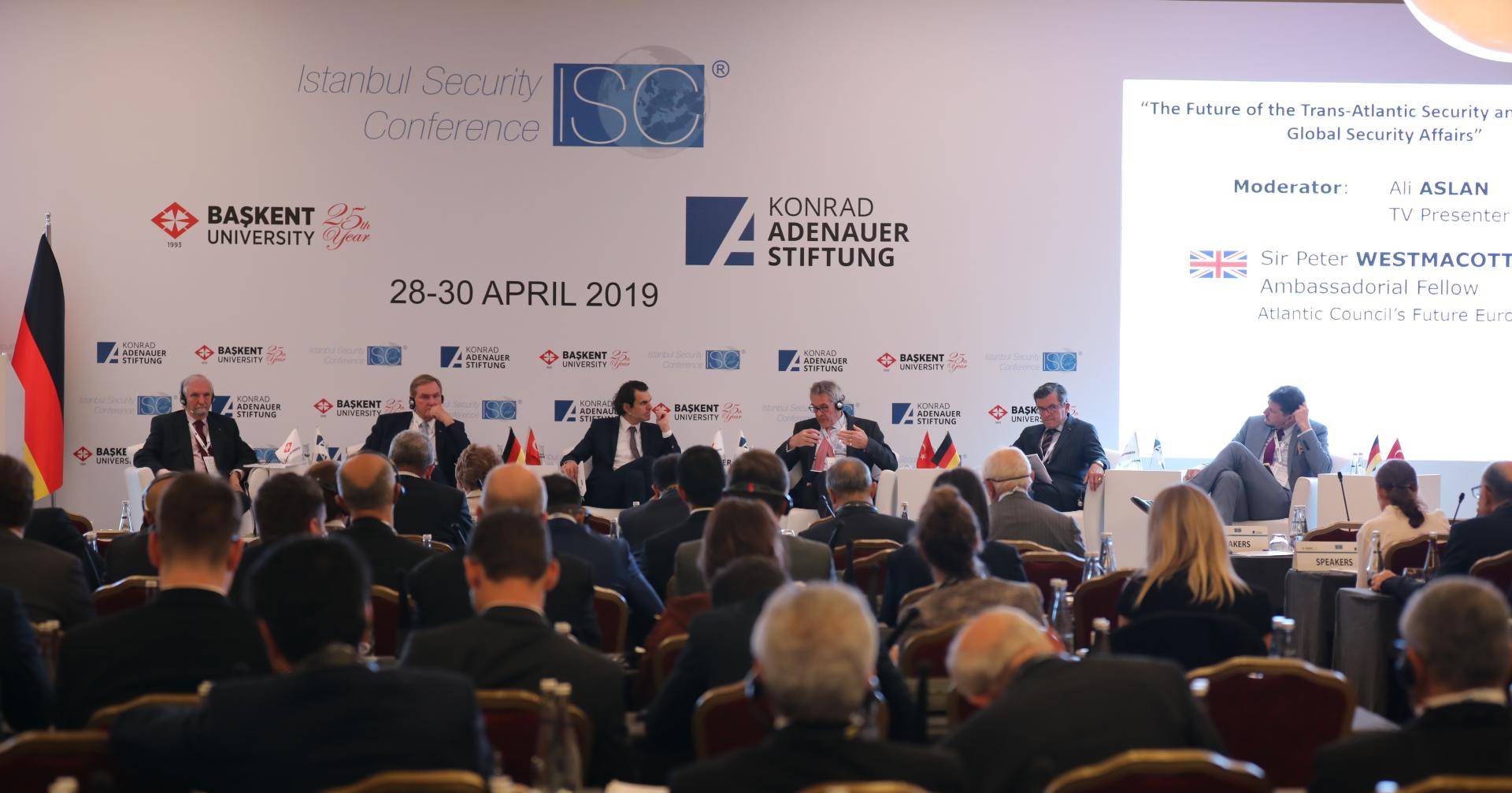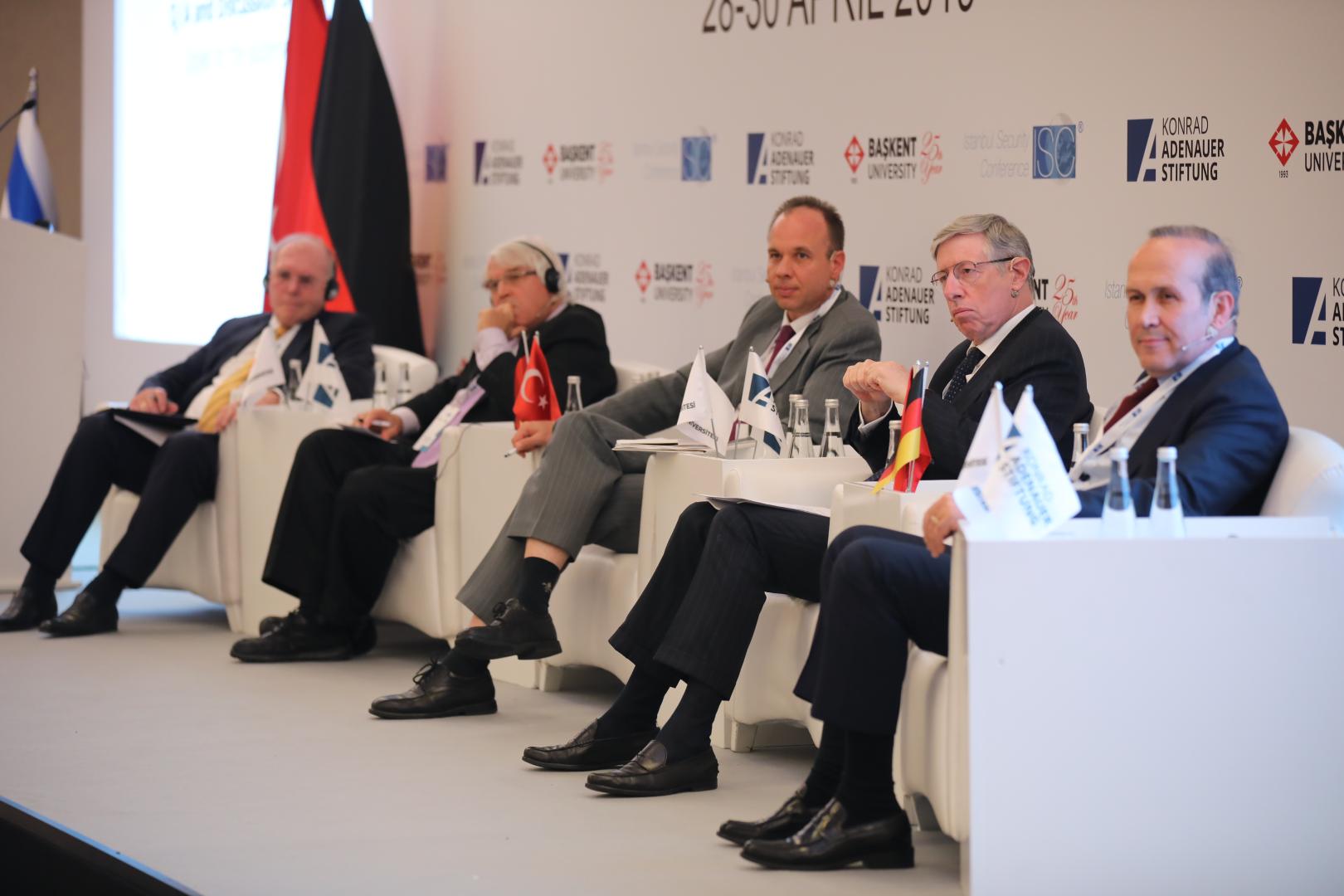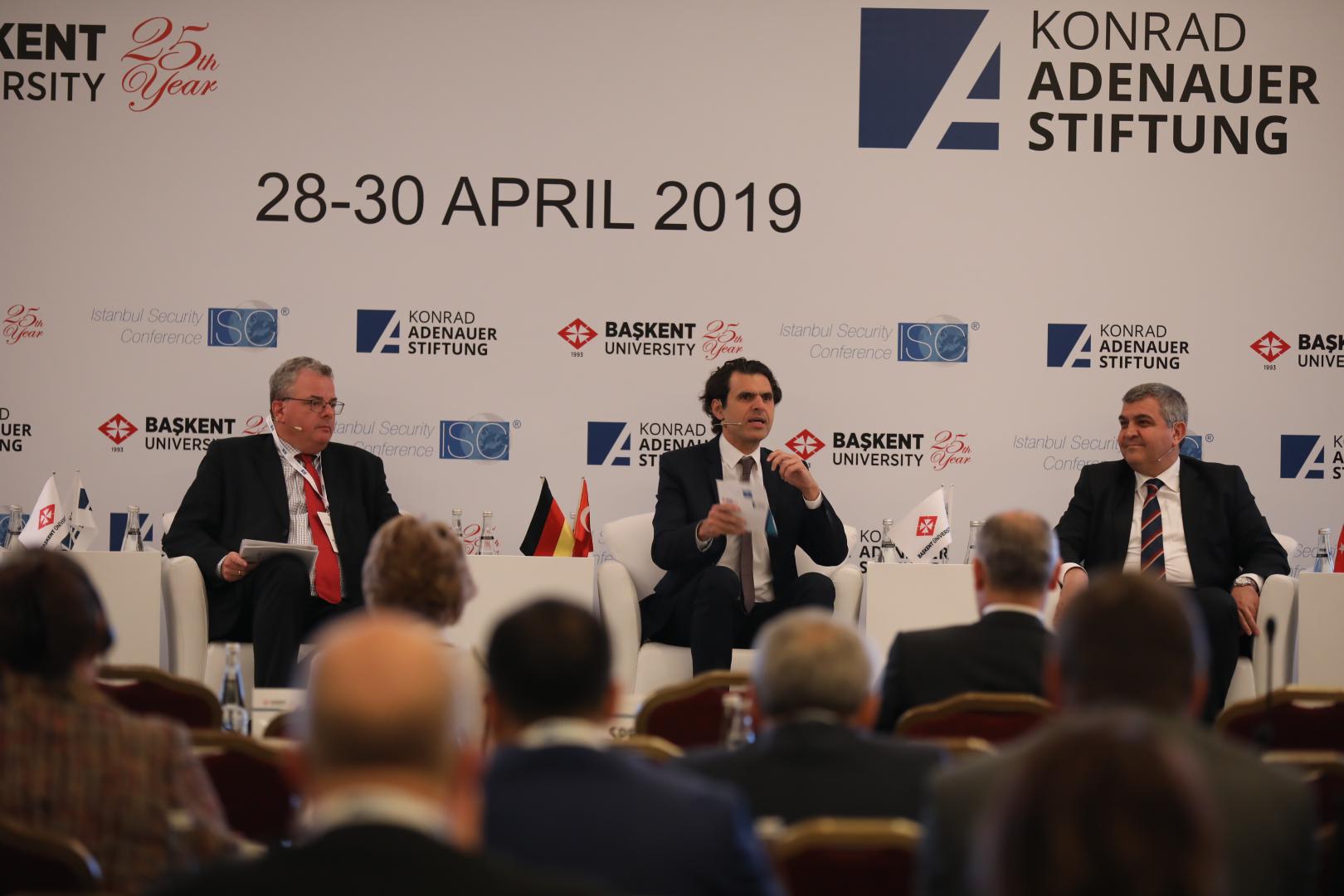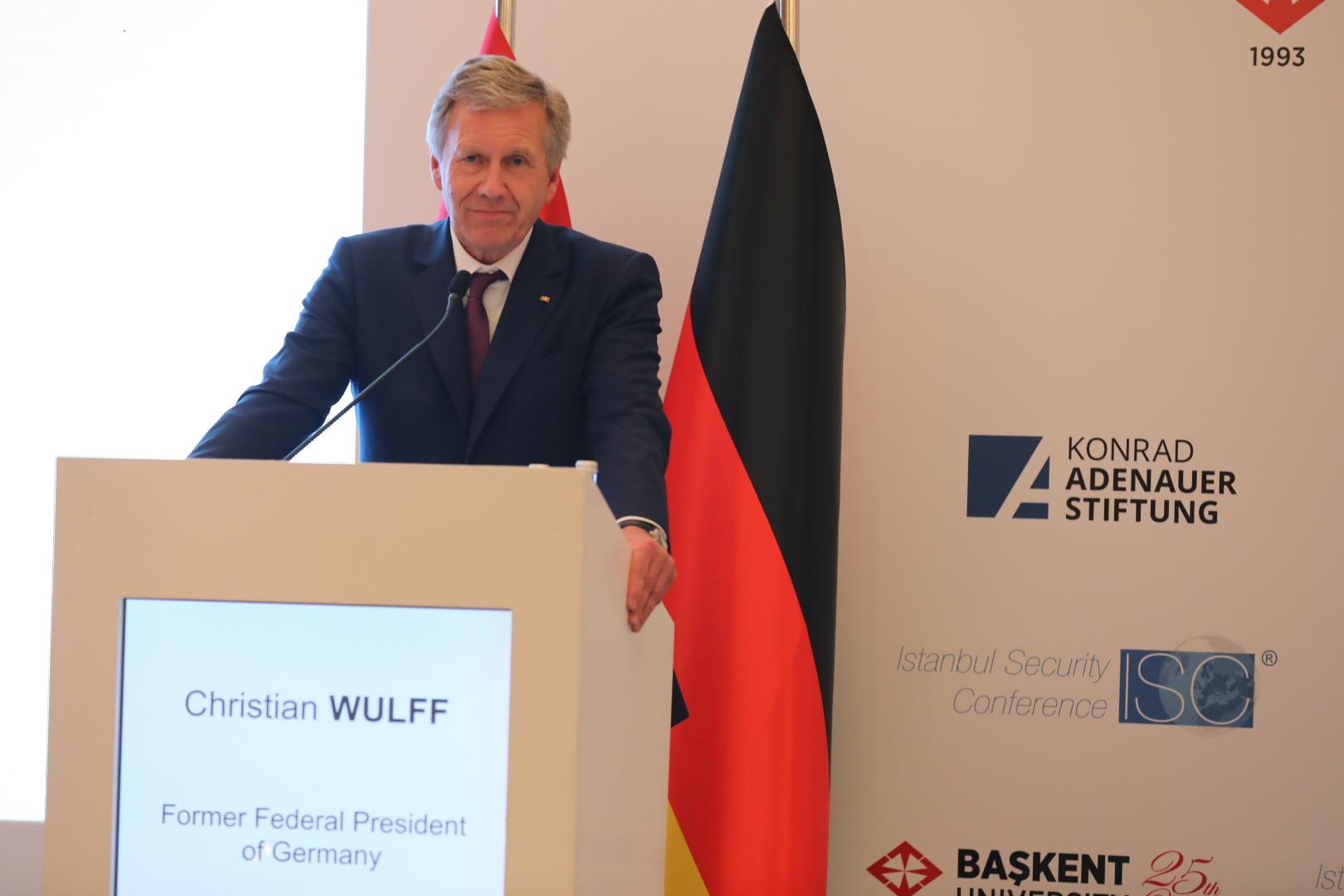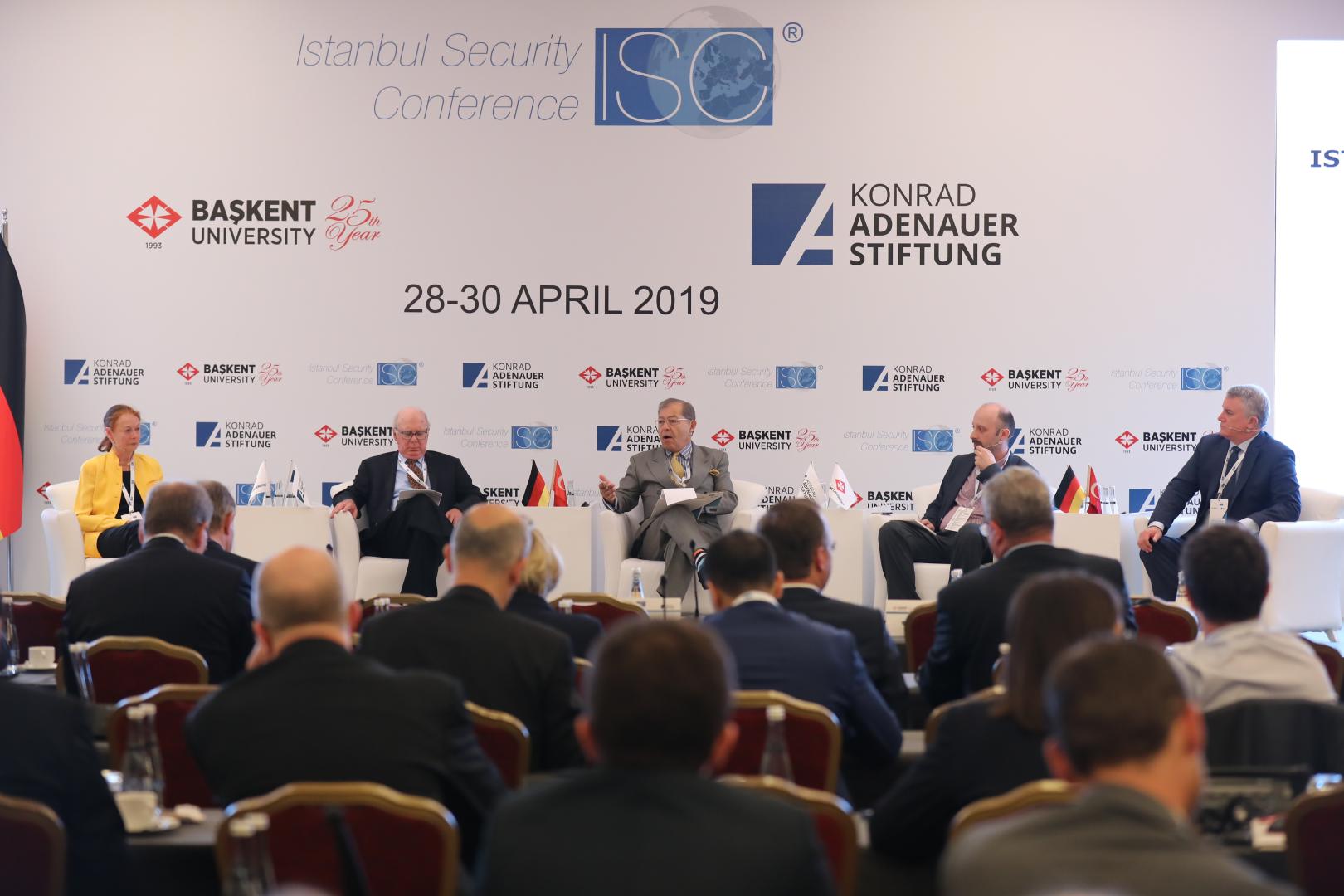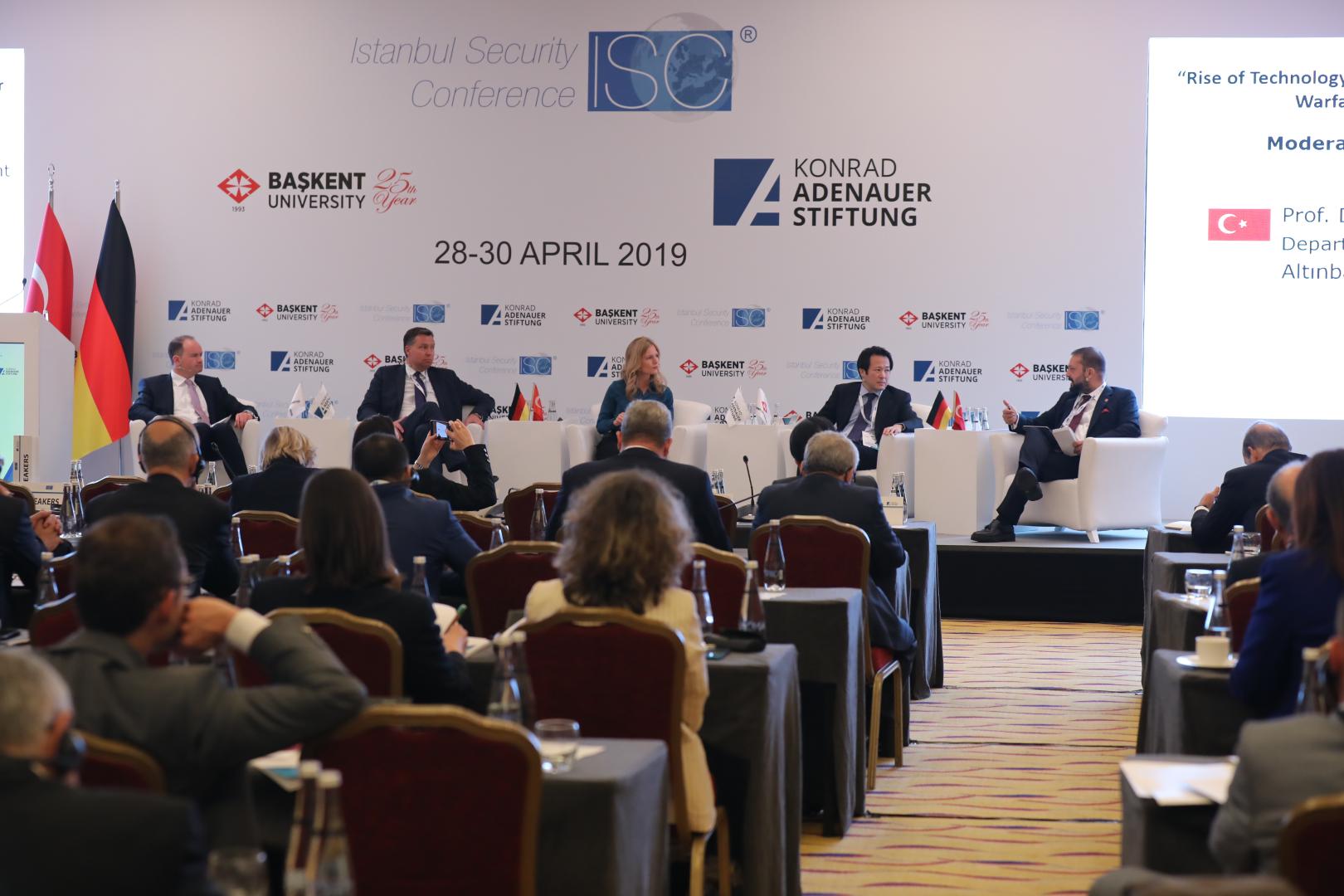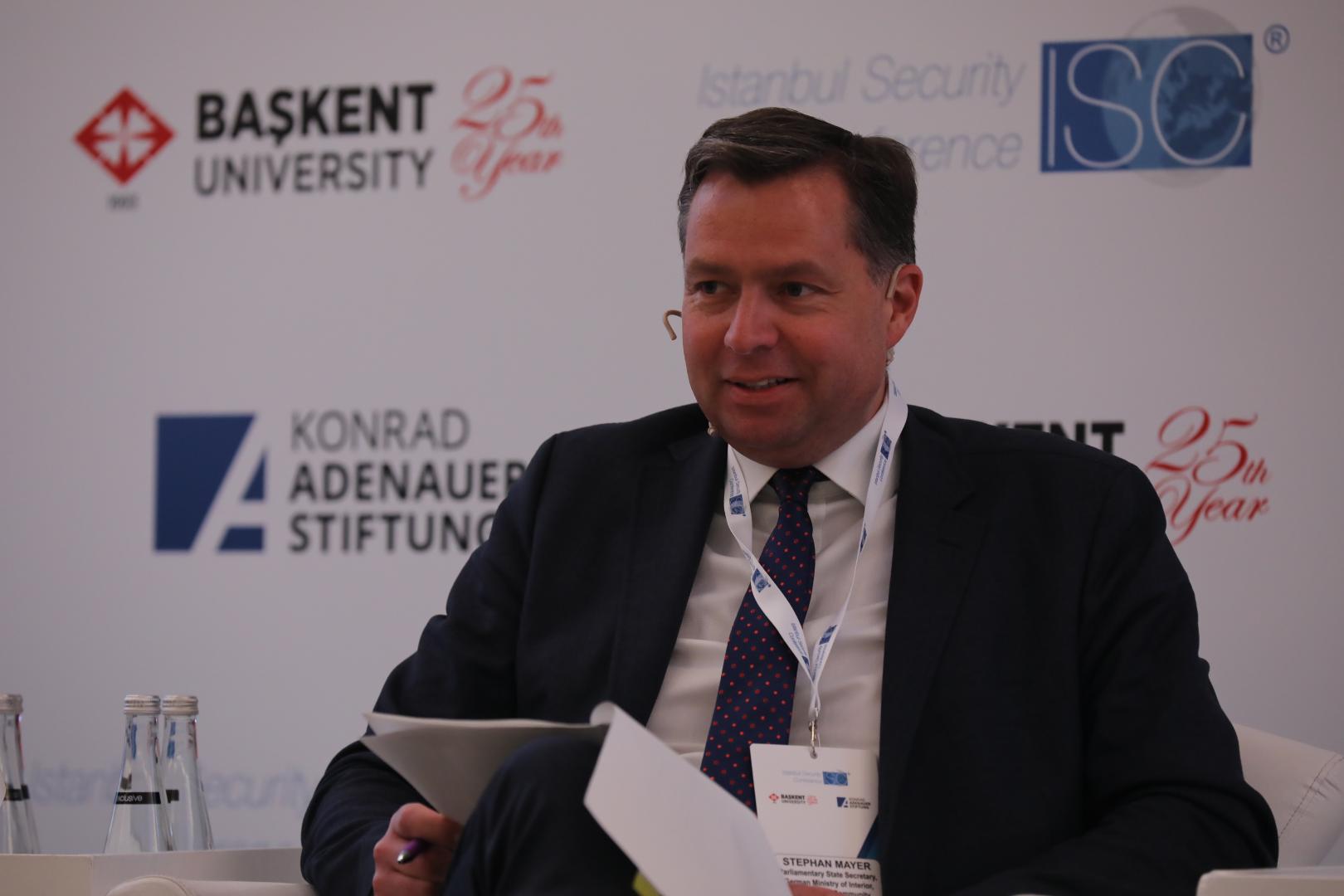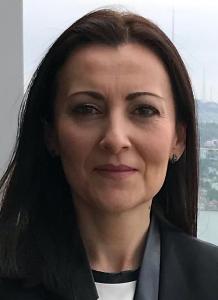Specialist conference
Details
The 12th Istanbul Security Conference® 2019 dealt with regional and global challenges and opportunities. Konrad-Adenauer-Stiftung Turkey and the Center of Strategic Research of the Başkent University Ankara invited speakers from politics, diplomacy, military, science and industry to controversly discuss the actual challenges. Speakers, discussants and commentators from 25 different countries participated at the ISC 2019.
In his welcoming remarks, Dr. Peter FISCHER-BOLLIN, Deputy Department Head of European and International Cooperation at Konrad-Adenauer-Stiftung Berlin, traced the historical development of the conference format since its 2008 inception with a view to the changing international security environment. Following his remarks, Prof. Dr. Ali HABERAL, President of Başkent University, praised the conference as a dialogue based on mutual values and interests in difficult times. H.E. Martin ERDMANN, Ambassador of the Federal Republic of Germany in Ankara, stressed the need for dialogue on common interests in the face of diverse sources of instability in the Euro-Atlantic region. He particularly encouraged the Turkish administration to review its decision to obtain the S-400 air defense system.
From the Turkish side, keynote speaker Assoc. Prof. Dr. Ibrahim KALIN, Ambassador and Presidential Spokesperson of the Presidency of the Republic of Turkey, painted a picture of Turkey's current security outlook. He called for more understanding and support from Turkey's western allies and friends concerning Turkey's security concerns, convinced that in today’s world states can only be secure in collaboration with others. Moreover, he contextualized Turkey's decision to purchase the Russian air defense system historically. When asked about the Syrian peace process and the role of Kurdish forces, Amb. KALIN ruled out any collaboration with Kurdish forces equating them, including the Syrian Democratic Forces, with PKK and condemning fighting terrorism with terrorism. He presented the northeastern part of Syria where Turkish forces are currently present as an example for creating stability in the country.
German keynote speaker Dr. Jürgen HARDT, Member of CDU Party and German Parliament Foreign Policy Spokesman of the CDU/CSU Parliamentary Group in the German Bundestag, replied to the former speakers by explaining Germany's quest for taking up more international responsibility, referring to the increased spending on defense and development cooperation. On the EU side, the security concerns stemming from Russia, Brexit and the United States led to the establishment of PESCO to strengthen EU capabilities within NATO. With reference to Turkey, Dr. HARDT identified three areas for strengthened dialogue: The Syria peace process, tackling instability in the Maghreb region, and economic cooperation - if not in the form of a Turkish EU accession then in an update of the customs union. The following discussion addressed primarily the role of S-400 integration within NATO structures.
Following the keynotes, the first panel addressed the topic “EU’s Demographic Challenge, Refugees and Migration: Impact on Social Stability and Border Security, Developing Preventive Policies and Strategies”. Gergely GULYAS, Minister of the Hungarian Prime Minister's Office, expressed the view that while the EU needs a common asylum and refugee policy, a common EU immigration policy is neither mentioned in EU treaties nor feasible considering the differences between member states. Akif Çağatay KILIÇ, Head of Turkish Delegation to the Parliamentary Assembly of the Council of Europe, raised attention to the fact that proactive instead of preventive policies are needed and drew attention to migration sources other than Syria. Matern VON MARSCHALL, Member of German Parliament, called for a combined approach of prevention and security measures, illustrating the example of the African continent in fighting the causes for emigration directly in the countries of origin to end illegal migration. Lady Olga MAITLAND, President of The Defence and Security Forum (DSF) London, stated that refugees and migrants in Europe will remain in their new countries of residence, raising the question of their social and economic integration.
The second panel addressed the topic of “The Future of the Trans-Atlantic Security and its Effect on Global Security Affairs”. Franz Josef JUNG, Former Minister of Defence of Germany, sketched an overview of current missions and future challenges of. He called for an increase in German defense spending, but also for a sober analysis of Germany's diverse existing capabilities. Ümit PAMIR, Ret. Ambassador and Former Permanent Representative of the Turkish Delegation to NATO, expressed that the transatlantic relations are now under strain, referring to rough patches in the history of the partnership. Sir Peter WESTMACOTT, Ambassadorial Fellow Atlantic Council’s Future Europe Initiative, portrayed fault lines in the recent transatlantic relationship in which institutions and alliances are being sidelined. He then called for Europe to take up a greater role in security policy. Dominik P. JANKOWSKI, Political Adviser and Head of the Political Section at the Permanent Delegation of the Republic of Poland to NATO, analyzed that the current adaptation is the biggest transformation of NATO since 1990. Since 2014, NATO has developed a number of tools and mechanisms to adapt to evolving threats. Rainer MEYER ZUM FELDE, Brigadier General (retired) and Senior Fellow at the Institute for Security Policy at Kiel University, analyzed two major challenges the transatlantic community needs to address: the imbalance of transatlantic burden sharing and the fact that Germany's Munich consensus of a growing defense responsibility is severed.
The third panel addressed the question “Syria’s Future: a Testing Ground for Proxy Wars and Geopolitical Agenda of Neighbours and Others or a Stable, Secular and Unified Nation?”. Christian SCHMIDT, Member of the German Parliament and Former Federal Minister, raised attention to different ways of managing the reconstruction of Syria, a process in which Turkey holds a crucial role. He also raised the question of Germany’s role. Prof. Dr. Carlo MASALA, Chair for International Politics and Project Director of the Metis Institute for Strategic Foresight at the University of the German Bundeswehr, affirmed that Syria shows that conflicts do have military solutions and that Syria may provide a blueprint for future conflict. Prof. Dr. İlter TURAN, Professor for International Relations at Bilgi University and Former President of the International Political Science Association, sketched the history of Syria characterized by authoritarian governments and domestic sectarian divisions. While most involved states agree that the top priority lies in giving Syria an independent government instead of establishing a client state, they diverge in their ideas for implementation.
The fourth conference panel explored “The New Geopolitics and Dynamics at the East Mediterranean Region: Risks and Opportunities”. Klaus NAUMANN, Retired General and Former Chief of Defence of Germany and Former Chairman of the NATO Military Committee, opened the panel by warning of the risks arising from failing states, conflict over natural resources, and possible Iranian and US miscalculations. Especially conflict in Lebanon, Syria, and Iraq could trigger further conflict and migration waves. .E. Massimo GAIANI, Ambassador of Italy in Ankara, warned of a deep crisis in Libya and mentioned Italy's engagement in Libya striving for a political agreement to bring peace, territorial integrity and prosperity. Alon LIEL, retired Ambassador and Former Permanent Secretary General of the Ministry of Foreign Affairs and Former Ambassador of Israel to Turkey, explained how Israel has become an internationally legitimized player while having all but abandoned the Israeli-Palestinian peace process, asking how the international community will react to an official end of the peace process. Namık TAN, retired Ambassador and Former Ambassador of Turkey to the US and Israel, explained that the Cyprus question has become hard to solve since the Republic of Cyprus became a member of the EU.
To conclude the panels, the day's Tour D’horizon focused on “The Future of Turkey-EU Relations”. Dr. Andreas NICK, Member of CDU Party in the German Parliament and Head of the German Delegation to the Parliamentary Assembly of the Council of Europe, analyzed that Turkey's EU accession process has been backtracked in the last years due to factors within Turkey. Instead of shutting the door, however, Dr. NICK called for a joint, realistic vision of a future relationship. Faruk KAYMAKCI, Ambassador and Deputy Minister of Foreign Affairs and Director for EU Affairs, provided a historical overview of EU-Turkey relations. He asked for accelerating the EU process and showing Turkey a clear prospect. He analyzed Turkey's motivation for joining the EU as the fact that the body determines the fate of the European continent, and Turkey wants to be a part of it in order to shape global politics as a part of Europe.
To conclude an insightful day, Christian WULFF, Former Federal President of Germany, held a keynote speech on “The Perspectives of German-Turkish Relations”. He began by tracing the history between the two states and two peoples, referring to various common projects of close collaboration and cultural exchange. Former President Wulff appealed to the German side to grant the Turkish counterparts more understanding and respect.
The second conference day was opened by a panel on “The Future of Warfare, New Technologies and Tactics in the Context Hybrid and Proxy Wars – Are Western Democratic States able to effectively confront Hybrid or Proxy Subversion and the Rise of Extremism”. Angela Christine GENDRON, Senior Research Fellow at the Centre for Security, Intelligence and Defence Studies at the Norman Paterson School of International Affairs at Carleton University, traced the beginning of the term of hybrid warfare to the Cold War as the combination of classical and non-classical acts of warfare to undermine citizen confidence in state authority and information sources, erode trust and popularize the adversary’s policy agendas. Michael DORAN, Senior Fellow Hudsons Institute Washington, focused on the case of Iran. He characterized America's abandoning of the JCPOA as an American problem beyond the Trump administration and advocated for a critical assessment of Iran's strategies. Nodar KHARSHILADZE, Former Deputy Minister of Internal Affairs of Georgia and Founder of the Georgia Strategic Analysis Center, concluded that current bureaucracies are not made to counter or even understand hybrid threats because of a twofold change in the threat environment: of the battlefield, requiring an update of weapons and strategies alike, and of society, which is being transformed by information and communication technologies. Emeritus Prof. Dr. Martin RUDNER, Distinguished Research Professor at Emeritus Carleton University, explained the use of proxies by friends and adversaries at the example of Canada's oil industry.
The last conference panel addressed the “Rise of Technology and the Fall of Usual Threats. Cyber Warfare and Cyber Security”. Stephan MAYER, Parliamentary State Secretary at the German Ministry of Interior, Building and Community and Member of CSU in the German Parliament, evaluated the reaction to the spring of 2019 attack on German research institutions positively. He stressed the importance of cooperation between national, regional and international entities and of information sharing about threats and attacks. Hans-Wilhelm DÜNN, President of the Cyber-Sicherheitsrat Deutschland e.V., alerted to a translation problem of cybersecurity issues, resulting in the cybersecurity challenge being recognized, but few actions taken. He called for standards, alert thresholds, and most importantly human networks to tackle these new threats. Prof. Dr. Ahmet K. HAN, Department of International Relations, Altınbaş University Istanbul, focused on the nature of the threat and alerted to the roles of Russia and China. He pointed out that cyber attacks, particularly to defense industry, critical infrastructure, government networks and private sector is vulnerable. One response to cyber attacks is the establishment of a Turkish agency partnering with the private sector focused on cybersecurity. Prof. Satoshi IKEUCHI of the Research Center for Advanced Science and Technology at The University of Tokyo compared NATO and US-Japan alliance treaty. The ensuing discussion centered on the question of dealing with security concerns in 5G infrastructure and the extent to which conventional threats remain.
In their closing remarks, Walter GLOS, Director of Konrad-Adenauer-Stiftung Turkey and Ercan ÇİTLİOĞLU, Başkent University, Center for Strategic Research thanked the organizers and participants to be part of this dialogue format which is decisive in finding new solution. The Istanbul Security Conference® 2019 made an important contribution in connecting decision makers from politics, diplomacy, science, military and industry.



